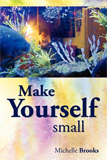Review by Grace Curtis
The Backwaters Press
3502 52nd Street
Omaha, Nebraska 68104-3506
ISBN 978-1-935218-26-5
2011, 84 pp., $16.00
http://www.thebackwaterspress.org/
You might think of Michelle Brooks’ volume of poetry, Make Yourself small, as the lyric portrayal of Eminem’s Detroit, complete with trailer courts, suicide, rape, violence, death, and guns. The collection evoked a sense of toughness often associated with West Texas and Detroit. Yet the poems drew me in despite their consistently dark subject matter. What kept me reading was not only Brooks’ skillful writing, but the way she conveys a poignant truth about how we adapt to life by forging our unique response to its difficulty.
In the first poem of the book, “Chiggers,” Brooks writes of a time in childhood when she and a friend were warned by the friend’s father to stay close to the trailer because “a woman had been gang-raped four trailers over.” Of an exhibitionist in the neighborhood, she writes in “All Day You Hear Sirens,” “it was the same old story,/someone showing you something/you didn’t want to see, nothing/new.” The lines that follow sum up what I see as the overarching theme of the book, which is Brooks’ own response to the horrific situations portrayed in these poems: “and you think—how can/he stand it in the rain, pants/around his ankles? You shut/him down.” According to Brooks, you shut it down, you make yourself small, small enough to duck the punches life throws at you, small enough to not attract attention.
The bleak subject matter continues throughout the collection. In “A Stranger to Nothing” she writes of a failed marriage, saying of her ex-husband, “He was someone to do things with while/my insides rotted away with thought of my/rape years before.” In this poem, we see a glimpse of a secondary theme: how we integrate accepting–or rather, adapting to–the things we have been taught as children by adults. She goes on in this poem to write these intriguing lines: “You can’t get everything from one person./My mother said that. She didn’t even try and her/divided heart never healed.” In “Bedtime Stories,” Brooks writes, “Men hide under cars, slash a woman’s/tendons so she can’t run, my mother/said” and “we’d play a game before/bed—What would you do if?, each/scenario with just enough opportunity/to escape if you were smart and quick.” In a poem called “Late,” about a grandfather’s abuse of the grandmother, Brooks again demonstrates how childhood experiences create our adult responses. “I could hear yelling through/the trailer window, and nobody knew what/to do so we drove away and left her there/with the only man she had ever loved.” She goes on to write, “Even/then, I understood you couldn’t save someone/unless you were willing to crucify yourself.”
As if speaking to both herself and to her reader, Brooks sums up a potential response to these poems in “You Can’t See It in This Picture.” This is a poem about pain. It is also about what you cannot see in a photograph–or rather what you cannot, or choose not, to see in life’s experiences. In this case it is symbolized by a missing cheap tiara on the head of the subject. Brooks writes, “Linda Lovelace says if you watch/Deep Throat closely, you can see her bruises.” She ends the poem by inviting the reader to “come closer” and then “or don’t,” suggesting that if you choose to, you can look away from the pain. Brooks’ poems enabled me as a reader to look directly at them. Form—-even free form—-places safe boundaries around difficult subject matter in a way that allows the poet to safely verbalize the unspeakable. This is what Brooks does so well in this collection.
In poem after poem, she delves into the dark and seamy side of life; however, the collection is not about these topics, but about how we respond to life. It is also about how we can spend a lifetime trying to heal from a rape, the death of a parent, or from all the things we were wrongly told about the world when we are children. In “Kentucky Derby Day at My Aunt’s House,” Brooks ends by describing how the family argues over the best way to make a Mint Julep, a drink (the life) they all share.
Each year our family
argues about how to make them, each
year they taste the same. It’s a tradition,
my mother says, you can’t watch the Derby
without drinking at least one. It doesn’t matter
if the mint leaves are bruised or crushed, I can’t
drink enough of other things to get the tastes
of the drink we all share out of my mouth.
In the latter part of the book, Brooks continues to write on the subject of rape–“Tailhook,” “Day of the Dead”–and the scar it leaves. She has used poetry to adeptly explore this and her other topics. In reading her collection, I came to an understanding of how she has come to terms with the difficult subject matter and with the contradictions that abound in her life. Some poems worked better for me than others, but overall, she has done a good job of providing the poetic discernment that separates a simple retelling of sordid facts from work that has universal appeal. While there is Detroit-worthy grittiness in this collection that makes the poems interesting, there is also intelligence and compassion and even occasional humor. This prevents the book from being sensational, maudlin, or depressing, and renders it deeply insightful.
Comments are closed.